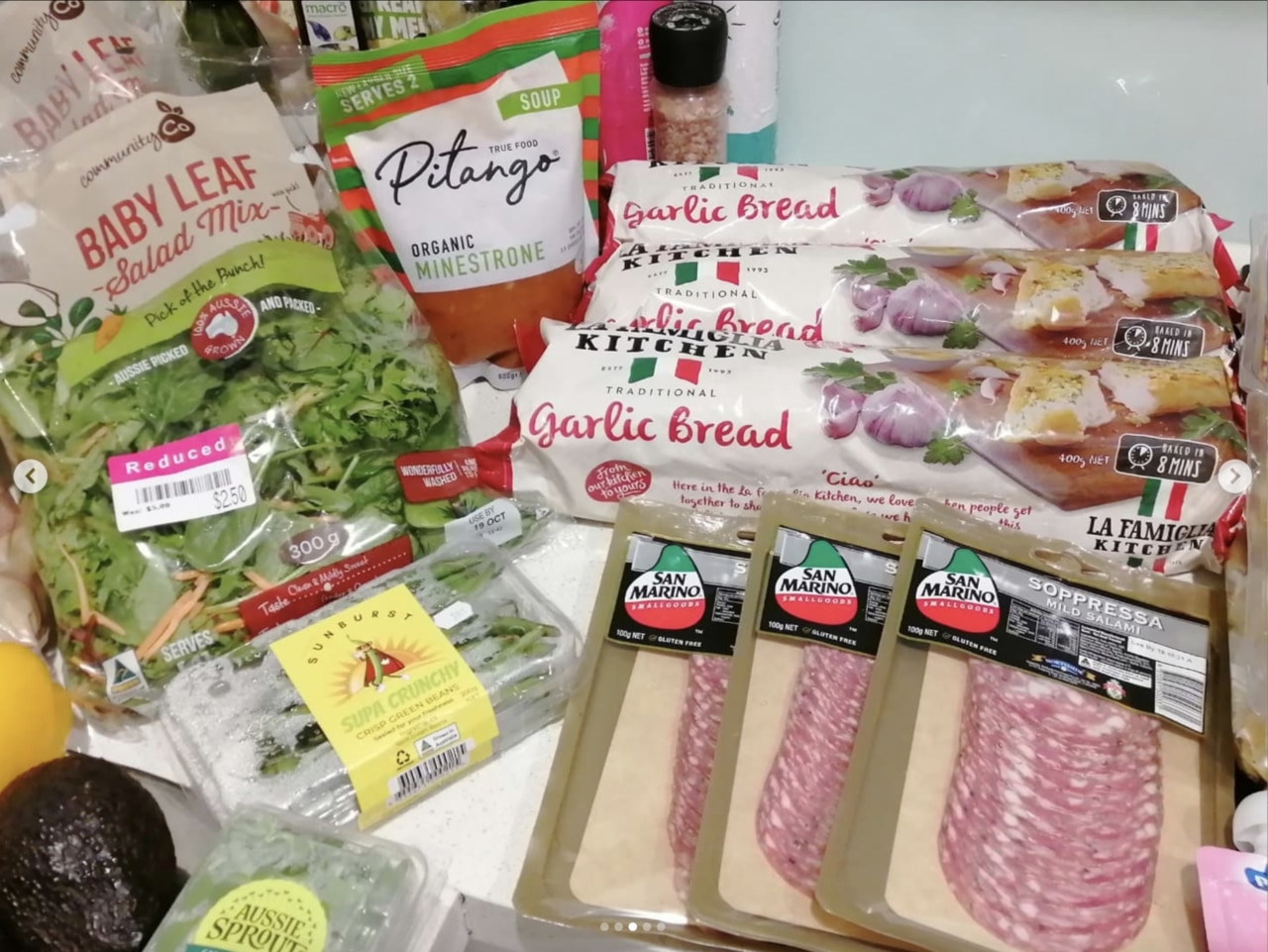Sophie, who used to love in Sydney but is now in Denmark, documents her dumpster dive ‘hauls’ on her Instagram page, which features bench spreads of fresh fruit and veg, packaged meats, cases of drinks and pretty much anything else you could ever want to buy at your local Woolies – all without spending a cent.
“I started dumpster diving myself in Sydney in October 2020 … my sister sent me this video of her dumpster diving in Denmark and I was like, ‘Oh, I wonder if you could dumpster dive in Sydney?’” she told news.com. a podcast I’ve Got News For You.
“I was so amazed at all the things that I could find in the dumpster and that kind of shocked me.”
Sophie is among a growing, albeit quiet, community of people who regularly frequent the industrial bins of supermarkets and grocery stores in order to find food.
While living in Australia, Sophie dumpster dived for a year, meaning she spent a grand total of only $300 for necessities while living off here vast hauls of freebies.
But while Sophie dumpster dives regularly, it’s not because she “has to” for financial reasons, it’s because she “wants to”.
“I’ve started to do a lot of research on the environmental part and to see what an impact that all this food has,” she explained.
“And especially in Australia … it’s like billions of dollars each year that is just thrown away. It’s a huge problem.”
While the concept of dumpster diving might seem dangerous or even disturbing, the sheer quantity of edible and often pricey food that is thrown out due to use-by dates means there’s a surplus of “free” food sitting in industrial bins.
It’s why Sophie began documenting her dumpster dives on Instagram – both to spread awareness about Australia’s food waste problem and to encourage others to join in.
Supermarkets throwing away billions in edible food
According to Food Bank Australia, 7.6 million tonnes of food is lost or wasted every year, 70 per cent of which is still fit for consumption.
Despite the existence of charities and not-for-profits dedicated to redistributing close-expiry or damaged but edible goods, use-by dates and manufacturing defects continue to be the biggest causes of waste.
“I remember I found 12 chilli sauces one day because one of the (glass bottles) had broken in that package – so they just threw everything out instead of taking out the broken one and just selling the rest. But they threw everything out,” Sophie said.
“One day I came home with 11kg of gum. And I calculated that if one person were to have one piece of gum each day, it will last for almost 10 years.”
How much does it save?
Here’s exactly what Sophie hauled in to prepare for a house party in October last year:
*Prices are calculated to current advertised prices from where items were sourced. Where certain products could not be sourced, their Woolworths equivalent was used.
8 x Tomatoes: $1.31 (each) $10.48
4 x Avocados: $1.60 (each) $6.40
1 x Aussie Sprouts pea shoots: $3.20
3 x Yellow capsicum: $3.73 (each) $11.19
3 x White seedless grapes bunches: $15.11 (each) $45.33
1 x White, washed potatoes (2kg) : $5
2 x Community Co Baby Salad Leaf Mix (300g): $5.00 (each) $10
1 x Pitango Organic Minestrone Soup (600g): $6.50
3 x La Famiglia Kitchen Traditional Garlic Bread (400g): $4.50 (each) $13.50
3 x San Marino Sopressa Mild Salami (100g): $7 (each) $21
6 x Latina Fresh Spinach & Ricotta Agnolotti (625g): $9 (each) $54
2 x Primo Duos Mild Twiggy Bites & Cheddar Cheese (50g): $4 (each) $8
6 x Pauls Kids Yoghurt Strawberry: $1.20 (each) $7.20
1 x Your Bakery Croissants 3 or 4 pack: $2.50
1 x Woolworths Mini Banana Muffin 8 Pack: $3.75
1 x Tip Top English Muffins Original 6 Pack: $5.30
1 x Coles Bagels Plain 4 Pack (360g): $2.50
2 x Burgen Wholemeal & Seeds Bread: $5.20 (each) $10.40
1 x Abbott’s Bakery Farmhouse Wholemeal Sandwich Slice Bread Loaf (750g): $4
3 x Bundaberg Ginger Beer (375ml): $2.90 (each) $8.70
3 x Coca-cola Classic Soft Drink Bottle (385ml): $3.75 (each) $11.25
1 x Daily Juice Pulp Free Orange Juice (2L): $5.30
Total value: $248
How to dumpster dive: rules and safety
Sophie said that over her almost two years dumpster diving, she has learned the vital importance of maintaining good health and hygiene practices.
And there are other rules and practices that the community of dumpster divers adheres to.
Established dumpster diver ‘Big B’ explained to I’ve Got News For You that prospective divers must adhere to ‘the code’:
1.Safety first
Dumpster diving is more than rocking up to an industrial bin and finding a prize item at the edge. Most likely you’ll be cutting open bin bags and sifting through actual rubbish.
“Be prepared to have the necessary tools, gloves to be safe – always be safe – and use tools that are going to make the job easier for you,” Big B said.
To ensure what you’re eating isn’t going to make you sick, generally don’t keep products where the packaging is broken or damaged.
When it comes to meats and dairy, always smell-check and be wary of any potential contamination issues. With fresh fruit and vegetables, if it looks good, smells good and you’ve washed it thoroughly, you should be OK.
Sophie said in order to make sure your fresh food nabbed from a dumpster is as fresh as possible, make sure to rifle through bins during the evening straight after stores throw away their produce. In Denmark, however, fresh produce from the previous day is thrown away in the morning.
2. First in, first served
It comes to no surprise that making sure you have mutual respect for other divers will only promote a safer diving experience.
“If you come across someone on the dumpster already, let them be. Say hello and just carry on to the next one,” Big B said.
“If you’re asked to move on, just move on, don’t cause any problems.”
3. Leave the bins tidier than when you arrived
Nobody likes a slob – even more so when your bins look like a possum got to them.
But Big B also said that cleanliness while dumpster diving is more than just a respectful gesture – it also helps to prevent stores from deliberately sabotaging edible produce.
“If you want to continue going into these dumpsters without any issues, or (without stores) locking the bins or destroying them other merchandise, you have to leave it cleaner than how you found it,” he said.
Once bins are locked by stores, or relocated to private property, it becomes illegal to dumpster dive. Ensuring that stores leave their bins publicly accessible allows dumpster divers to continue their practice safely and legally.
Sophie noted how, before she left Australia, her local grocery store started to “cut the packaging” and “smash the fruit” before throwing it in the bin.
4. Don’t be greedy
Once you get the hang of dumpster diving, it can be tempting to stash away kilos of food found in a single haul.
But with so many products found close to or at expiration, hauling more food than you can consume or share can do more harm and pose more health and safety risks than just leaving it behind, Big B said.
“If you know you can share it, then share it. Otherwise, you’re only changing the geography of the rubbish, if you’re not using it or doing anything with it,” he added.
“I share almost 95 per cent of what I find – my donation pile is greater than my ‘keep for myself’ pile.”
.


